21 Toxic Foods For Dogs - Avoid These
Dogs often eat things they shouldn’t. Some foods are not only bad but can be deadly. Keep your dog safe by knowing these 21 dangerous foods.
9 min read
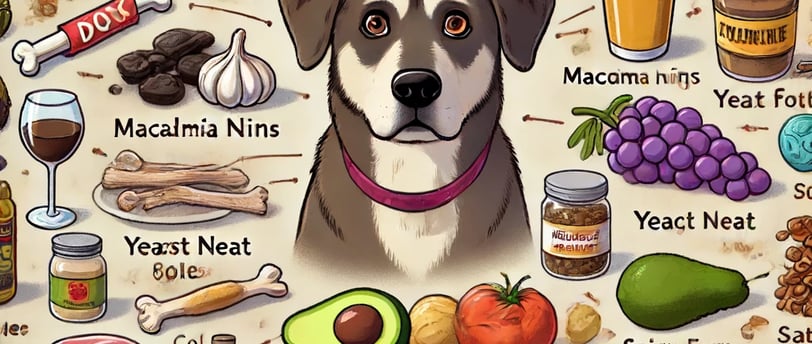

21 Toxic and Dangerous Foods For Dogs
Dogs often eat things they shouldn’t. Some foods are not only bad but can be deadly. Keep your dog safe by knowing these 21 dangerous foods.


1. Chocolate
Chocolate contains theobromine and caffeine. These cause vomiting, seizures, and even death. Keep chocolate far from dogs.
Prevention Tips:
Store chocolate in high places or locked cabinets.
Educate your family about the dangers of chocolate.
Symptoms to Watch For:
Vomiting
Restlessness
Seizures
Immediate Actions:
Contact Your Vet immediately.
Induce Vomiting if advised by a vet.
Provide Water to help dilute toxins.
Monitor Your Dog for any changes in behavior.
FAQs:
Can a small amount of chocolate harm my dog?
Yes, even small amounts can be harmful.What should I do if my dog ate chocolate?
Call your vet immediately for advice.
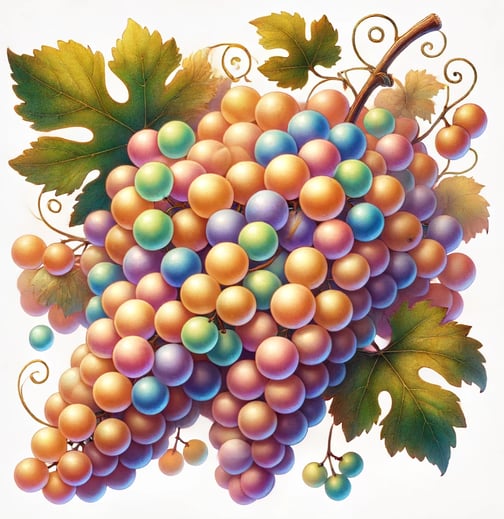

2. Grapes
Grapes and raisins can cause sudden kidney failure. Even a small amount is dangerous. Keep them away from dogs.
Prevention Tips:
Store grapes and raisins in inaccessible places.
Be cautious with fruit salads that contain grapes.
Symptoms to Watch For:
Vomiting
Diarrhea
Lethargy
Immediate Actions:
Contact Your Vet right away.
Induce Vomiting only if directed by your vet.
Provide Water to keep your dog hydrated.
Monitor Your Dog closely for any signs of distress.
FAQs:
Can one grape really harm my dog?
Yes, even one grape can cause serious harm.Are dried grapes (raisins) equally dangerous?
Yes, raisins are just as harmful as fresh grapes.


3. Raisins
Raisins lead to severe kidney damage in dogs. Avoid them as treats. They are very toxic.
Prevention Tips:
Keep raisins out of reach.
Avoid feeding your dog baked goods containing raisins.
Symptoms to Watch For:
Vomiting
Loss of appetite
Increased thirst
Immediate Actions:
Contact Your Vet immediately.
Induce Vomiting if your vet recommends it.
Provide Water to help flush out toxins.
Monitor Your Dog for unusual behavior or symptoms.
FAQs:
Are raisins more dangerous than grapes?
Both are equally dangerous and should be avoided.
What should I do if my dog ate raisins?
Seek veterinary help immediately
.
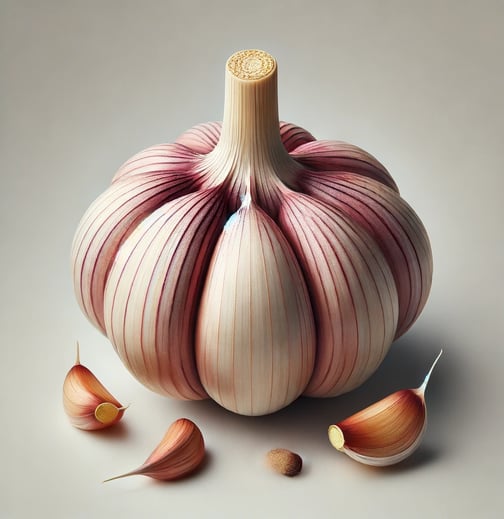

4. Garlic
Garlic damages red blood cells, leading to anemia. It’s best avoided completely.
Prevention Tips:
Avoid giving your dog food seasoned with garlic.
Check labels of dog treats for garlic powder.
Symptoms to Watch For:
Weakness
Rapid breathing
Pale gums
Immediate Actions:
Contact Your Vet for guidance.
Do not induce vomiting unless advised.
Provide Water to keep your dog hydrated.
Monitor Your Dog’s energy levels and appearance.
FAQs:
Is cooked garlic safe for dogs?
No, cooked garlic is still harmful.What are signs of garlic poisoning?
Symptoms include weakness and pale gums.
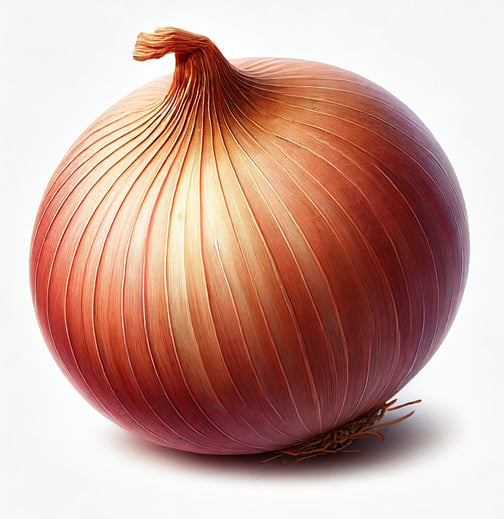

5. Onions
Onions cause anemia by destroying red blood cells. All forms are dangerous.
Prevention Tips:
Keep onions and foods containing onions out of your dog’s reach.
Educate family members about the dangers of onions.
Symptoms to Watch For:
Vomiting
Weakness
Reduced appetite
Immediate Actions:
Contact Your Vet as soon as possible.
Induce Vomiting if recommended by the vet.
Provide Water to help reduce toxin concentration.
Monitor Your Dog for any signs of distress.
FAQs:
Can cooked onions harm my dog?
Yes, both raw and cooked onions are toxic.How long does it take for symptoms to appear?
Symptoms can appear within a few days of ingestion.


7. Alcohol
Alcohol leads to intoxication, lack of coordination, coma, or death. Keep all alcoholic beverages away from dogs.
Prevention Tips:
Store alcoholic beverages out of reach.
Clean up spills immediately.
Symptoms to Watch For:
Vomiting
Disorientation
Slow breathing
Immediate Actions:
Contact Your Vet right away.
Do not induce vomiting unless advised.
Provide Water to keep your dog hydrated.
Monitor Your Dog closely for signs of intoxication.
FAQs:
Can dogs get drunk?
Yes, and it’s very dangerous for them.What should I do if my dog drank alcohol?
Seek veterinary help immediately.


8. Coffee
Coffee contains caffeine, causing hyperactivity, elevated heart rate, and seizures. It's very dangerous.
Prevention Tips:
Keep coffee and coffee grounds out of reach of your dog.
Dispose of coffee grounds in secure trash bins.
Symptoms to Watch For:
Restlessness
Rapid breathing
Tremors
Immediate Actions:
Contact Your Vet immediately.
Induce Vomiting if the vet recommends it.
Provide Water to help reduce caffeine levels.
Monitor Your Dog for hyperactivity or seizures.
FAQs:
Is decaf coffee safe for dogs?
No, even decaf coffee can be harmful.How much coffee is dangerous?
Any amount can be harmful to dogs.


9. Macadamia Nuts
Macadamia nuts cause weakness, vomiting, tremors, and hyperthermia. Avoid feeding them.
Prevention Tips:
Keep nuts and nut-containing foods out of reach.
Avoid feeding any nuts to your dog.
Symptoms to Watch For:
Vomiting
Tremors
Increased body temperature
Immediate Actions:
Contact Your Vet immediately.
Induce Vomiting if advised by the vet.
Provide Water to help with hydration.
Monitor Your Dog for weakness or tremors.
FAQs:
Are all nuts dangerous for dogs?
Not all, but macadamia nuts are highly toxic.What symptoms should I watch for?
Symptoms include vomiting and tremors.
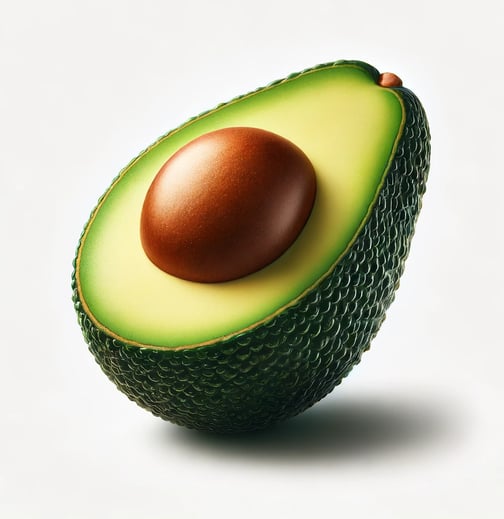

10. Avocado
Avocados contain persin, causing vomiting and diarrhea. The pit is also a choking hazard.
Prevention Tips:
Keep avocados out of reach.
Avoid feeding your dog any part of the avocado.
Symptoms to Watch For:
Vomiting
Diarrhea
Difficulty breathing (if the pit is swallowed)
Immediate Actions:
Contact Your Vet immediately.
Induce Vomiting if your vet advises it.
Provide Water to help with hydration.
Monitor Your Dog for digestive issues or choking.
FAQs:
Is avocado flesh safe for dogs?
No, all parts of the avocado are harmful.What should I do if my dog swallows an avocado pit?
Seek veterinary help immediately.


11. Yeast Dough
Yeast dough expands in the stomach. It can cause pain and bloating. The fermentation can lead to alcohol poisoning.
Prevention Tips:
Keep dough away from pets.
Let dough rise in a secure place.
Symptoms to Watch For:
Swollen belly
Vomiting
Pain
Immediate Actions:
Call Your Vet right away.
Follow vet's advice on inducing vomiting.
Give Water to help dilute alcohol.
Watch Your Dog for signs of distress.
FAQs:
Why is yeast dough dangerous?
It expands and causes bloating and poisoning.
What should I do if my dog ate yeast dough?
Contact your vet immediately.
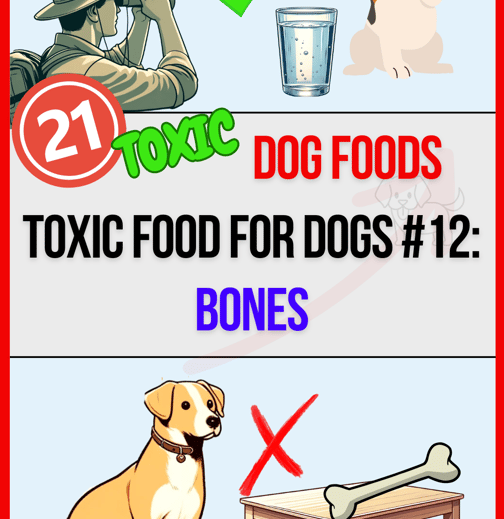

12. Bones
Bones can splinter and cause choking. They can also tear the digestive tract. Avoid giving bones to your dog.
Prevention Tips:
Do not give bones to your dog.
Dispose of bones in secure trash.
Symptoms to Watch For:
Choking
Vomiting
Trouble pooping
Immediate Actions:
Call Your Vet right away.
Do not induce vomiting.
Give Water to help pass the bone.
Watch Your Dog closely.
FAQs:
Are raw bones safe for dogs?
No, raw and cooked bones can splinter.What if my dog swallowed a bone?
Contact your vet immediately.


13. Milk
Most dogs are lactose intolerant. Milk can cause stomach issues. Avoid giving dairy products.
Prevention Tips:
Do not give your dog milk.
Choose lactose-free options.
Symptoms to Watch For:
Diarrhea
Gas
Belly pain
Immediate Actions:
Call Your Vet if symptoms last.
Give Water to stay hydrated.
Watch Your Dog for discomfort.
FAQs:
Is any amount of milk safe?
Most dogs can't handle milk. Avoid it.What if my dog drinks milk?
Watch for stomach issues and call your vet.
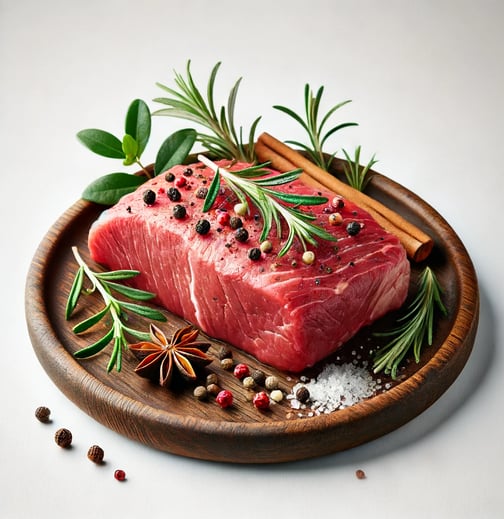

14. Raw Meat
Raw meat can have harmful bacteria. These can cause infections. Always cook meat for your dog.
Prevention Tips:
Cook all meat before feeding.
Store raw meat out of reach.
Symptoms to Watch For:
Vomiting
Diarrhea
Fever
Immediate Actions:
Contact Your Vet quickly.
Give Water to help stay hydrated.
Watch Your Dog for infection signs.
FAQs:
Is raw meat safe for dogs?
It's risky. Cooking meat is better.What if my dog ate raw meat?
Watch for symptoms and call your vet.


15. Raw Eggs
Raw eggs can have Salmonella and E. coli. They also affect skin and coat health. Cook eggs before feeding.
Prevention Tips:
Cook eggs for your dog.
Keep raw eggs out of reach.
Symptoms to Watch For:
Vomiting
Diarrhea
Skin problems
Immediate Actions:
Contact Your Vet quickly.
Give Water to help stay hydrated.
Watch Your Dog for infection signs.
FAQs:
Are cooked eggs safe?
Yes, they are good for dogs.What if my dog ate raw eggs?
Watch for symptoms and call your vet.
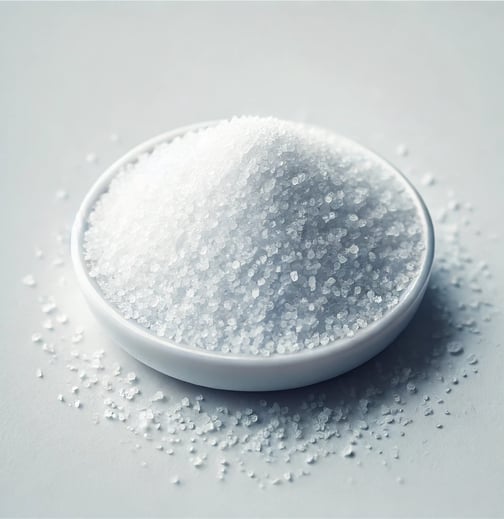

16. Salt
Too much salt causes many problems. It can make dogs sick or even die. Avoid salty foods.
Prevention Tips:
Do not give salty snacks.
Store salt securely.
Symptoms to Watch For:
Vomiting
Diarrhea
Seizures
Immediate Actions:
Contact Your Vet right away.
Give Water to help with hydration.
Watch Your Dog for salt poisoning signs.
FAQs:
Is a little salt okay?
Dogs don’t need extra salt. Avoid it.What if my dog eats salty food?
Watch for symptoms and call your vet.
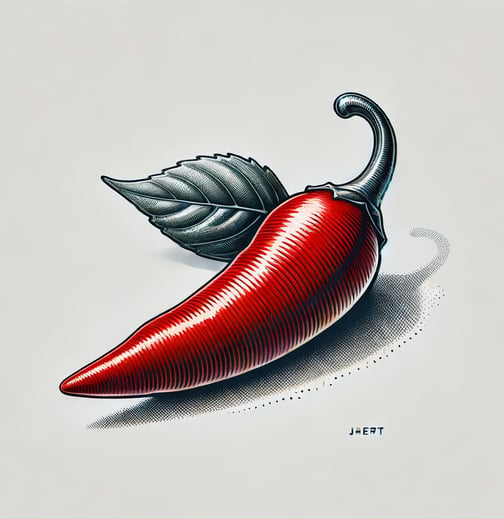

17. Spicy Foods
Spicy foods upset a dog's stomach. They cause pain and vomiting. Avoid giving spicy treats.
Prevention Tips:
Keep spicy foods away.
Do not give table scraps with spices.
Symptoms to Watch For:
Vomiting
Diarrhea
Stomach pain
Immediate Actions:
Contact Your Vet if symptoms are bad.
Give Water to help soothe the stomach.
Watch Your Dog for discomfort.
FAQs:
Can dogs taste spicy food?
They react to the irritants in it.What if my dog eats spicy food?
Watch for stomach issues and call your vet.
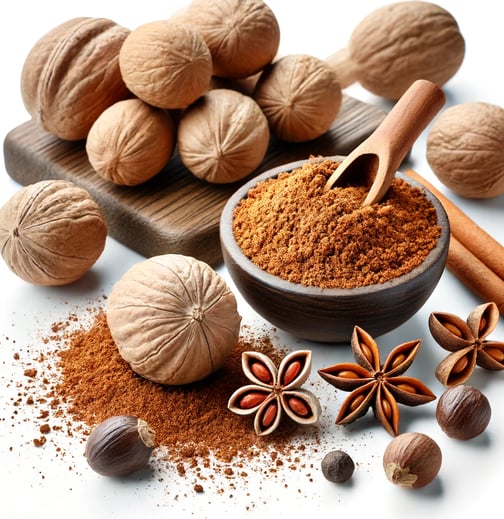

18. Nutmeg
Nutmeg has myristicin. This causes hallucinations and seizures. Keep it away from dogs.
Prevention Tips:
Store nutmeg safely.
Do not give baked goods with nutmeg.
Symptoms to Watch For:
Hallucinations
Fast heart rate
Seizures
Immediate Actions:
Contact Your Vet right away.
Give Water to help with hydration.
Watch Your Dog for toxicity signs.
FAQs:
Is a little nutmeg safe?
No, even small amounts are harmful.What if my dog eats nutmeg?
Seek veterinary help fast.


19. Coconut Products
Coconut water and oil have high potassium. They can cause health issues. Use them with caution.
Prevention Tips:
Limit coconut product use.
Store coconut products safely.
Symptoms to Watch For:
Stomach upset
Tiredness
Diarrhea
Immediate Actions:
Contact Your Vet if symptoms last.
Give Water to help stay hydrated.
Watch Your Dog for digestive issues.
FAQs:
Are coconut products safe?
Small amounts might be okay. Ask your vet.What if my dog eats coconut oil?
Watch for stomach upset and call your vet.


20. Tobacco
Nicotine in tobacco is highly toxic. It can cause vomiting and tremors. Keep tobacco away from dogs.
Prevention Tips:
Store tobacco safely.
Do not use tobacco around pets.
Symptoms to Watch For:
Vomiting
Tremors
Fast heart rate
Immediate Actions:
Contact Your Vet right away.
Do not induce vomiting.
Give Water to help with hydration.
Watch Your Dog closely.
FAQs:
Is second-hand smoke bad for dogs?
Yes, it can hurt their lungs.What if my dog eats tobacco?
Seek vet help right away.
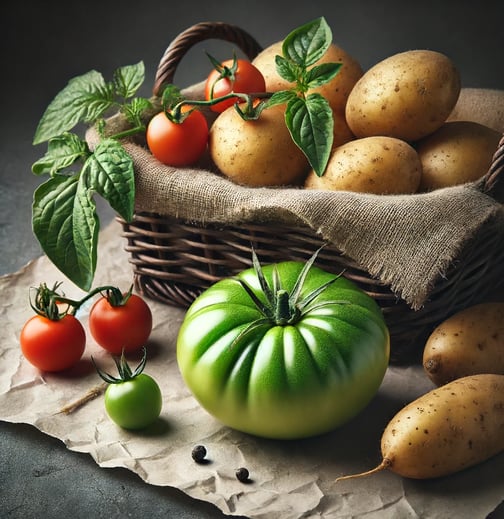

21. Raw Potatoes and Green Tomatoes
These have solanine. It can upset a dog's stomach. Avoid giving them to your dog.
Prevention Tips:
Store raw potatoes and tomatoes safely.
Do not feed these to your dog.
Symptoms to Watch For:
Vomiting
Diarrhea
Lethargy
Immediate Actions:
Contact Your Vet right away.
Give Water to help with hydration.
Watch Your Dog for stomach issues.
FAQs:
Are cooked potatoes safe?
Yes, cooked potatoes are okay in moderation.What if my dog eats raw potatoes?
Watch for symptoms and call your vet.
Final Tips
Always keep harmful foods out of reach. Educate your family about these dangers. In case of ingestion, act quickly and consult your vet. Your dog’s safety depends on your vigilance.
Bonus Tip
For more expert advice on keeping your dog safe and training tips, check out our ebook 'Dog Training Secrets.'
This comprehensive guide will help you ensure your dog is well-behaved and happy. Learn More Here.
Contact
Follow
© DogsAndTips.com - 2024 → ∞




